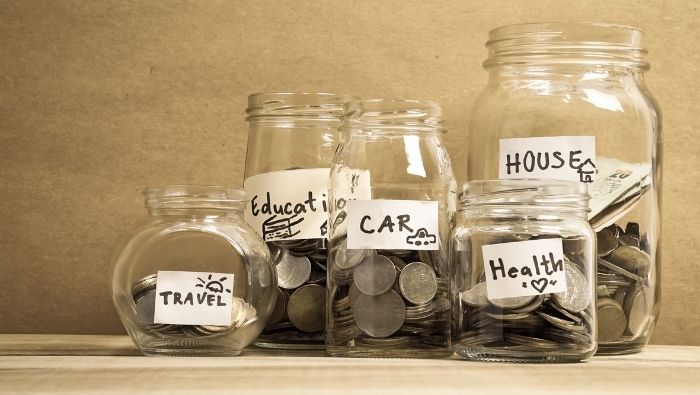A Smart System for Saving for Large Purchases

We explore how making use of a savings account or two along with a checking account can help you not only keep track of your money, but also help accumulate it faster to save for large purchases.
Gary,
My wife and I will be needing a car soon. I want to know how I can go about saving for it. Also, for buying special items for the house, should I use my savings account at my bank? Is it wise to use my checking account for monthly expenses only?
Thank you,
AC
Why a single checking account is not the best wat to manage your money
AC packs a lot into one paragraph. And, he’s right in assuming that how you handle your money will make a difference in how much money you have.
Many families invite money troubles by keeping all their available funds in a checking account. Money flows in and out without much thought.
It’s certainly a convenient way to handle your money. But, not the best way to manage it.
Aren’t we making a big deal over nothing? No. A good system for controlling your money can save you time and make you money. It can provide helpful information at a glance and keep your money from disappearing. It’s the first basic step to controlling your finances.
Think about how your life works. Your expenses could be divided into four categories. Monthly routine bills, larger expected bills (like vacations), larger unexpected bills (like auto repairs) and very large expenses (like a house or car).
Just as there are different kinds of expenses, the money that’s used to pay for them should be handled differently. And AC has a pretty good system started.
Sign Up for Savings
Subscribe to get money-saving content by email that can help you stretch your dollars further.
Twice each week, you'll receive articles and tips that can help you free up and keep more of your hard-earned money, even on the tightest of budgets.
We respect your privacy. Unsubscribe at any time.
Why you should limit your checking account to paying monthly bills
Let’s flip his questions around and look at the last one first. Yes, it is best to limit your checking account to paying regular monthly expenses. There are a couple of reasons why that’s true.
It’s easy to write a check to pay a bill. That’s good. But that easy spending can be bad. If you’re saving money for a new stove, you don’t want the money too accessible. Temptation could make it easy to buy a fishing rod or theatre tickets.
When money is real tight, it might be necessary to keep everything in a checking account. Naturally, the risk is that the money tends to disappear making it harder to save.
Why your “extra” money is safer in a savings account
AC is doing the right thing by putting some money into a savings account. Taking it out of the checking account protects it. If AC wants to dip into savings for a special purchase, he’ll need to consciously make a decision to take the money from the savings account. The money won’t disappear a little at a time.
The ‘big expense’ money needs to be safe and reasonably available. It’s helpful to be able to know how much money you have available for the unexpected. Most people use a savings account or money market fund.
And since you don’t routinely dip into savings, a look at your account balance will quickly tell you how much you have for the homeowners insurance or auto repair bill.
If AC is saving for a new car he might even want to set up a separate savings account just for that purpose. In fact, watching the balance grow could be a way to encourage him to save even more.
Making use of a savings account or two along with his checking account could definitely help AC keep track of his money. It could also help him to accumulate it faster.
Reviewed May 2023
About the Author
Gary Foreman is the former owner and editor of The Dollar Stretcher. He's the author of How to Conquer Debt No Matter How Much You Have and has been featured in MSN Money, Yahoo Finance, Fox Business, The Nightly Business Report, US News Money, Credit.com and CreditCards.com.
Sign Up for Savings
Subscribe to get money-saving content by email that can help you stretch your dollars further.
Twice each week, you'll receive articles and tips that can help you free up and keep more of your hard-earned money, even on the tightest of budgets.
We respect your privacy. Unsubscribe at any time.
Wouldn't you like to be a Stretcher too?
Subscribe to get our money-saving content twice per week by email and start living better for less.
We respect your privacy. Unsubscribe at any time.
Popular Articles
- 7 Habits of Highly Frugal People
- 5 Simple Budget Cuts That Can Save $200 a Month
- How to Track Down Unclaimed Funds Owed You
- 32 Ways to Save Money on Your Utility Bills
- Do You Need Credit Life Insurance When Buying a New Car?
- How to Maximize Profits When Selling Online
- Staying Motivated to Continue Digging Yourself Out of Debt
On After50Finances.com
- 9 Things You Need to Do Before You Retire
- You Didn’t Save Enough for Retirement and You’re 55+
- When Empty Nesters Reorganize and Declutter Their Home
- Reinventing Your Career in Your 50s or 60s
- What Mature Homeowners Should Know about Reverse Mortgages
- 2 Reasons to Collect Social Security Benefits As Soon As Possible

